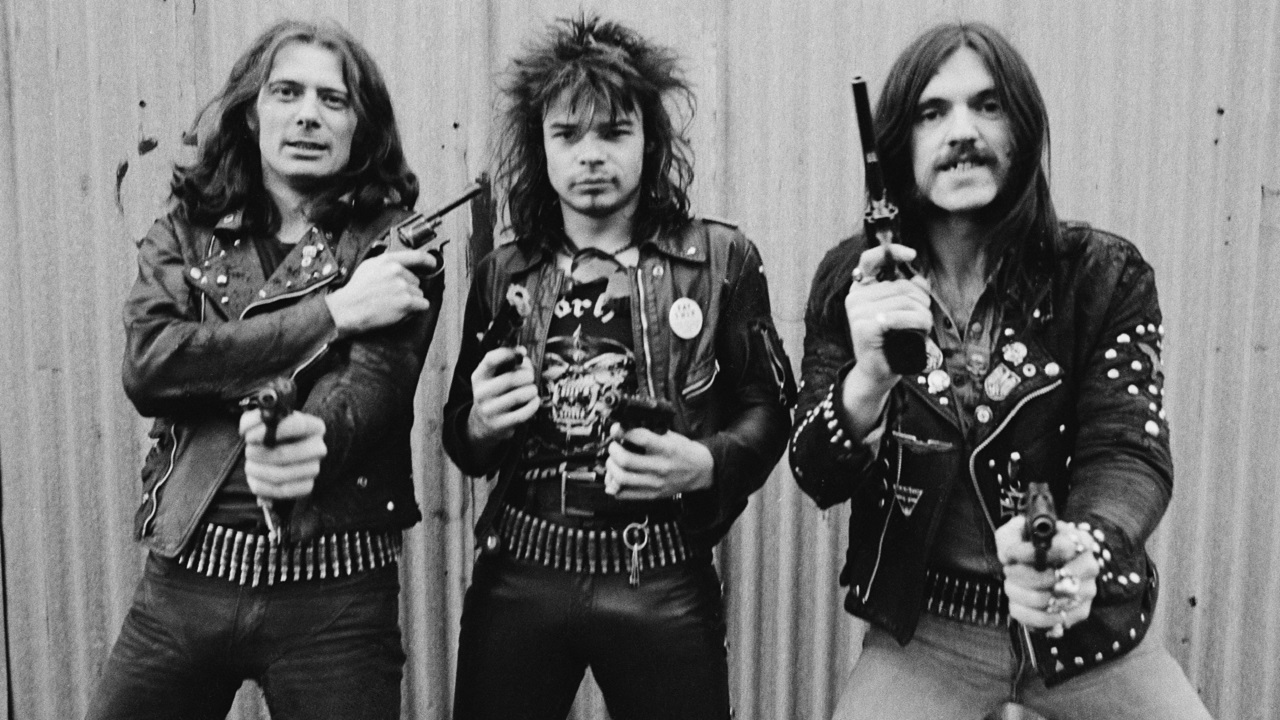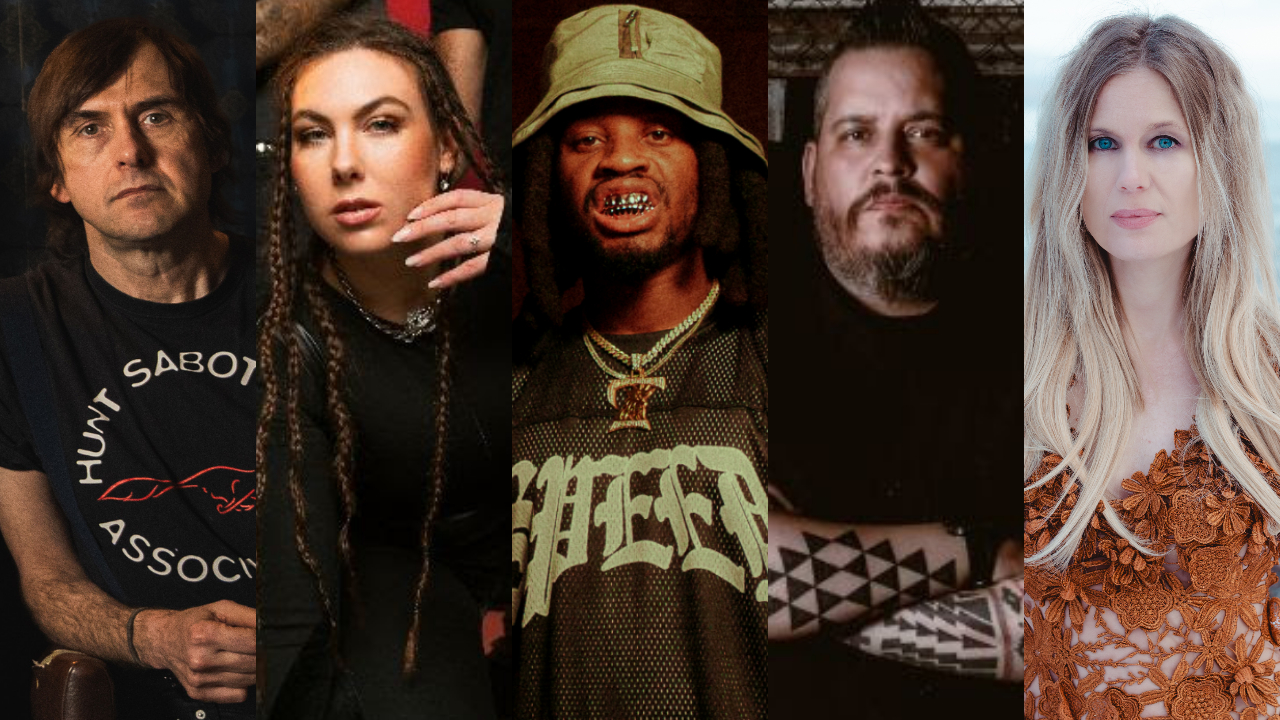The 10 best Motorhead songs (that sound nothing like Ace Of Spades)
Ace Of Spades might have been Motorhead's defining anthem, but these 10 songs show just how diverse their sound could be

Select the newsletters you’d like to receive. Then, add your email to sign up.
You are now subscribed
Your newsletter sign-up was successful
Want to add more newsletters?

Every Friday
Louder
Louder’s weekly newsletter is jam-packed with the team’s personal highlights from the last seven days, including features, breaking news, reviews and tons of juicy exclusives from the world of alternative music.

Every Friday
Classic Rock
The Classic Rock newsletter is an essential read for the discerning rock fan. Every week we bring you the news, reviews and the very best features and interviews from our extensive archive. Written by rock fans for rock fans.

Every Friday
Metal Hammer
For the last four decades Metal Hammer has been the world’s greatest metal magazine. Created by metalheads for metalheads, ‘Hammer takes you behind the scenes, closer to the action, and nearer to the bands that you love the most.

Every Friday
Prog
The Prog newsletter brings you the very best of Prog Magazine and our website, every Friday. We'll deliver you the very latest news from the Prog universe, informative features and archive material from Prog’s impressive vault.
They were Motorhead, they played rock'n'roll. The fact they played it harder and louder than just everybody else was besides the point, as was the fact they inspired whole new schools of abrasive noise in punk and metal alike. But while Ace Of Spades became Motorhead's defining anthem - despite not necessarily being their best song - any Motorhead fan can tell you there was so much more to the band than bluster and amps.
With a new expanded edition of the band's swansong Bad Magic unearthing the unreleased ballad Greedy Bastards, we figured that it's high time to highlight some of the brilliant songs from Motorhead's back catalogue that show off their sonic diversity.
First, some ground rules: no covers or songs by other bands (so no Please Don't Touch, no Hellraiser - much as we love those songs), and we're specifically limiting the number of ballads we salute (as that'd be just a little too easy - and perhaps deserves a list of its own).
With that in mind, here are the best Motorhead songs that sound nothing like Ace Of Spades...

10. Don't Let Daddy Kiss Me (Bastards, 1993)
Starting out with one that bends one of our ground-rules, Don't Let Daddy Kiss Me was written by Lemmy and originally offered to legendary singers Joan Jett and Lita Ford, amongst others. Although enthusiastic about the song, nobody took Lem up on the offer and Motorhead recorded it themselves on 1993's Bastards.
A (mostly) acoustic ballad about child abuse, the song is a far cry stylistically from the fire and bluster the band had peddled from the late 70s, only Lemmy's seething lyrical turns hinting at the rage boiling beneath the surface. This wasn't the first Motorhead ballad (that goes to Love Me Forever, from 1991's 1916), but it showed a much softer side to Motorhead that fans were unprepared for.
9. Iron Horse/Born To Lose (Motorhead, 1977)
When Lemmy was fired from prog cosmonauts Hawkwind in 1975, he set out to create the world's greasiest rock'n'roll band. but they weren't quite there when the earliest line-up of Motorhead - featuring Larry Wallis and Lucas Fox alongside classic Motorhead drummer 'Philthy Animal' Taylor - recorded their first album in 1976.
Cobbled together mostly from songs Wallis and Lemmy had written with their respective former bands, On Parole ended up languishing on the shelf until 1979 (coincidentally around the same time the band was taking off - funny that). As such, many of its songs were re-recorded by the 'classic trip' line-up of the band (Lemmy, Taylor, 'Fast' Eddie Clarke) for their 1977 debut and, although heavier, its songs still lacked the power and urgency that would define Motorhead going forward.
Sign up below to get the latest from Metal Hammer, plus exclusive special offers, direct to your inbox!
That said, Iron Horse/Born To Lose is a fascinating mid-point between the spacy compositions Lemmy had been working on with Hawkwind and the serpentine grooves that slipped into early Motorhead records, the band steadily finding their own niche.
8. Just 'Cos You Got The Power (Eat The Rich, 1987)
Many of Motorhead's angriest songs come with a proto-thrash forcefulness that makes it feel like the band are hitting you at 120mph with a freight-train. Just 'Cos You Got The Power is a massive subversion of that formula; Lemmy's usual bellow drips with a venom that is reflected in the song's lyrical content ('You might be a financial wizard with a sack of loot/But all I see is a slimy lizard with an expensive suit'), but is accompanied by a steady, marching pace that gives then-guitarists Phil Campbell and Wurzel plenty of space to strut their stuff.
Released as a b-side to the similarly apoplectic Eat The Rich, the song is a showcase of how well the dual-guitar set-up worked for Motorhead (for a time at least) and became a live staple in future years, Lem and co. even drafting in Slash to play the song with them at Download Festival 2010. Just 'Cos You Got The Power might just be the best example of Lemmy's cutting lyrical ability - unambiguously fighting back against oppression and corruption.
7. Orgasmatron (Orgasmatron, 1986)
Considering Overkill set the tone for thrash and just about every other extreme genre that would arise over the next decade, you might be surprised to find it isn't Motorhead's only flirtation with the dark side.
The steady marching beat of 1986's Orgasmatron isn't entirely outside the realms of what the band had done before, but Lemmy's hoarse, demonic rasp takes on a whole new edge of ferocity that borders on black metal. No wonder Abbath started a Motorhead tribute band - this song basically set up his career.
6. Metropolis (Overkill, 1979)
By the time they got to Overkill in 1979, Motorhead were well on the way to becoming the force of nature we all know and love. That didn't stop a few more classic rock'n'roll compositions slipping in amidst the thunder and lightning, however (in fact, Lemmy even claimed that he wanted Tina Turner to sing I'll Be Your Sister).
Metropolis was almost as reliable a fixture of the band's live sets as Ace Of Spades or Overkill, offering band and audience alike a chance to take their foot off the pedal and grab a breath. As much as anything, Metropolis feels like a holdover from Lemmy's days in Hawkwind, albeit with a requisite level of motor oil and grease heaped on by his new unit.
5. Killed By Death (No Remorse, 1984)
As heavy metal hit its commercial apex in the mid-80s, even Motorhead couldn't be kept away from the glitz and glamour. Granted, by that point the band's classic line-up had crumbled, but when the four-piece went into the studio in Spring '84 to record new tracks ahead of the upcoming No Remorse compilation, they showed that Motorhead were still going strong.
The twin-guitar assault of Phil Campbell and Wurzel again takes centre-stage in this iconic rock'n'roll stomper, the band giving over to guitar hero theatrics in ways they seldom had before - or would again after. Lemmy looms in with a sense of devilish glee as he delivers each line, his delighted cackle further in the song showing he utterly loved playing the rock'n'roll villain when the opportunity arose.
4. 1916 (1916, 1991)
Motorhead sang about war enough throughout their careers they could probably give Sabaton a run for their money, but Lemmy never shied away from his disgust with the act. Love Me Forever on 1991's 1916 was the first glimpse of a softer side to Lemmy and co., but even that song had its breakout heavy moments.
Not so with 1916 - the album's title-track delivered with a sobriety and fragile beauty that was seldom explored again. The band barely feature in the song - Lemmy's voice underpinned by minimal drums, organs and even strings adding to the sublime stylistic departure that 1916 represents.
3. Another Perfect Day (Another Perfect Day, 1983)
Motorhead's classic trio line-up were fractured by the departure of guitarist 'Fast' Eddie Clarke in 1982, but barely had time to ruminate on their loss before they hit the studio for a follow-up to 1982's (comparatively) lacklustre Iron Fist.
New guitarist Brian 'Robbo' Robertson joined fresh from the ranks of Thin Lizzy, and brought along some of that band's excellent showmanship to his only album with the band, 1983's Another Perfect Day. Much as Lemmy complained about how long Robertson spent on his guitar tracks, the album's title-track shows it was time well spent, Robertson effectively writing his own dual guitar assault that contrasted wailing leads with a strutting rhythm guitar riff that was more in line with Van Halen than anything the band had experimented with before.
2. The Game (Hammered, 2002)
After a patchy period from the mid-90s, Motorhead entered the new milennium renewed and with a sense of venomous vigour. Tapped up to write a song for WWE wrestler Triple H, they came out with an Orgasmatron style looming beast that was propelled by the ferocious assault on the kit provided by Mikkey Dee.
2002's Hammered saw some of the heaviest songs Motorhead ever released (Red Raw, Kill The World), but The Game was yet more proof that even if they were built for speed, some of Motorhead's best songs came from lurking in the shadows waiting to strike.
1. Whorehouse Blues (Inferno, 2004)
Lemmy goes Johnny Cash. Motorhead weren't afraid to break out the acoustic guitars from time to time - Lemmy even claiming he'd written Ace Of Spades initially on an acoustic guitar when the band re-recorded it in 2010 - but Whorehouse Blues is perhaps as far down the blues rabbit hole as the band ever went.
The closing track of 2004's Inferno, Whorehouse Blues is a lively slice of Cash-like country blues, complete with harmonicas and nimble-fingered solos that showed that the band didn't need to switch to ballads if they wanted to turn the volume down. Though Lemmy would explore this rockabilly-like style more with The Headcat, it remains a tantalising vision for a very different route his artistry could have took.
Staff writer for Metal Hammer, Rich has never met a feature he didn't fancy, which is just as well when it comes to covering everything rock, punk and metal for both print and online, be it legendary events like Rock In Rio or Clash Of The Titans or seeking out exciting new bands like Nine Treasures, Jinjer and Sleep Token.

